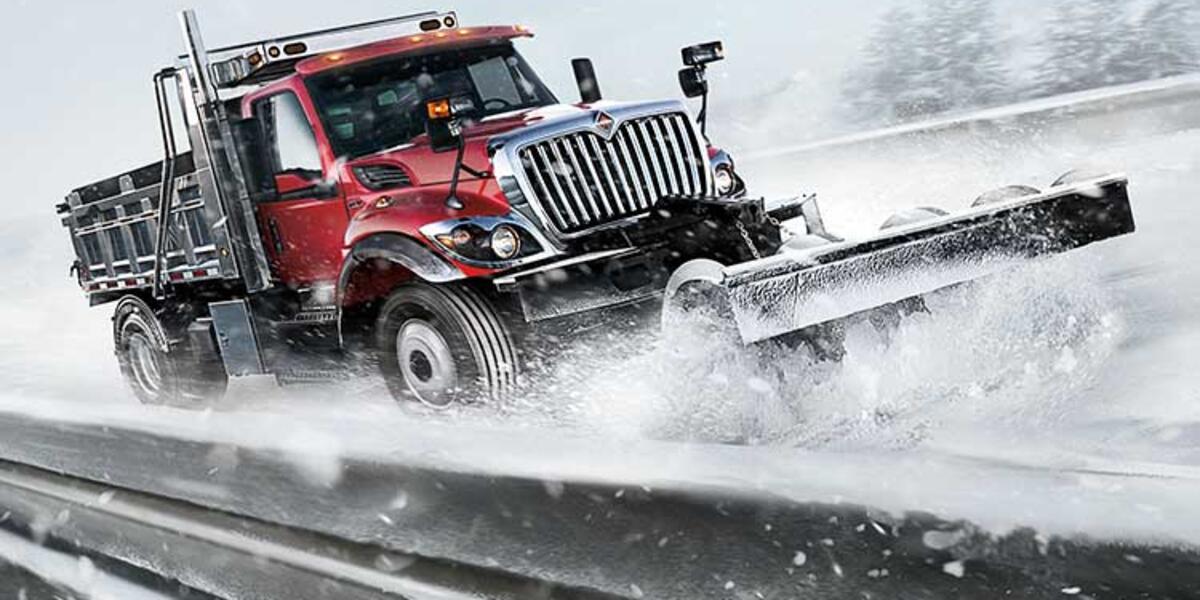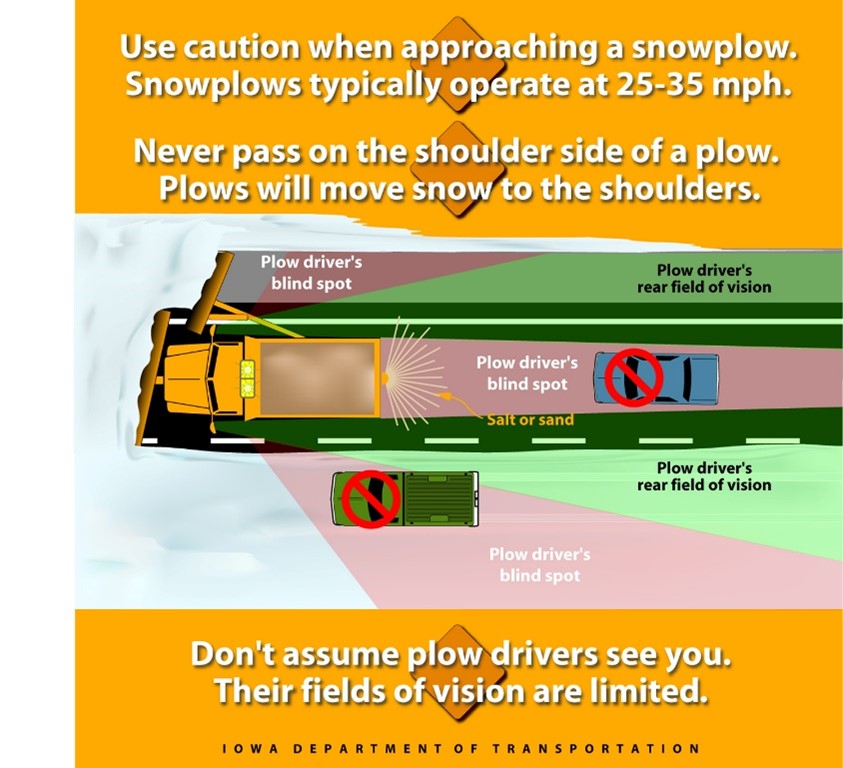This Wednesday, a truck driver was killed after colliding with a snowplow on a Colorado interstate. Shortly before 5 a.m. on February 12, the Colorado State Patrol (CSP) responded to a reported crash on northbound I-25 near Walsenburg. According to CSP, the initial investigation indicates that a semi-truck struck the rear of a CDOT snowplow at mile marker 57. The truck driver was pronounced dead at the scene, while the snowplow driver was hospitalized with injuries. The investigation is ongoing.
With the number of winter storms bringing snow across the country this week, now is a good time to remind your drivers about the dangers of approaching and passing snowplows on the road.
During winter storms, snowplows work around the clock to make roads passable. These large vehicles can pose a hazard for drivers who follow too closely. Keep these safety tips in mind to help ensure both your drivers’ safety and the ability of snowplow operators to do their jobs effectively:
-
Keep a safe distance from snowplows: Plow drivers cannot see directly behind their trucks and may need to stop or reverse unexpectedly. Maintaining a safe distance helps protect you from potential collisions and prevents your vehicle from being hit by sanding material spread on slick roadways.
-
Be aware of snowplows on multi-lane highways: Snowplows can operate in any lane or on the shoulder. Stay alert, especially near interstate ramps and "authorized vehicle only" turnarounds.
-
Never drive through a snow cloud or whiteout conditions: It is impossible to determine whether these conditions are caused by crosswinds or a snowplow. Be patient—snowplow operators periodically pull over to allow traffic to pass safely.
Snowplow operators are extremely safety-conscious, but they need your help. Stay back and let them safely do their job of clearing the road for you. Don't take a chance. Don't crowd the plow!
Each year the city of Lincoln Nebraska Transportation and Utilities department has a contest for children to name the cities snowplows.
Here are this year’s winning names:
- The Big LePlowski
- Sleetwood Mac
- Ctrl Salt Delete
- Betty Whiteout
- Buenos Snowches
- Han Snowlo
- Plowabunga
- Sled Zeppelin
Heart Month Tip:
What can you do to help control hypertension?
- Eat healthy foods: Follow a dietary approach to control hypertension by eating plenty of fruits, vegetables, whole grains, and low-fat dairy products. Increase your potassium intake and reduce your consumption of saturated fat, trans fat, and total fat. Additionally, limit the amount of sodium (salt) in your diet.
- Maintain a healthy weight: If you are overweight, losing even 5 pounds can help lower your blood pressure.
- Increase physical activity: Aim for at least 30 minutes of physical activity each day.
- Limit alcohol consumption: Even if you are healthy, alcohol can raise your blood pressure. Drink in moderation—no more than one drink per day for women and two per day for men.
- Avoid smoking: Tobacco damages blood vessel walls and accelerates the hardening of arteries. If you smoke, seek help to quit—your doctor can provide support and resources.
- Manage stress: Reduce stress as much as possible by practicing healthy coping techniques such as muscle relaxation and deep breathing. Ensure you get plenty of sleep to support overall well-being.
FMCSA Settles Rear Underride Guard Label Issue- CVSA Will Not Issue Violations at Roadside for Missing Labels
Question:
Does an illegible, incomplete, or missing rear impact guard certification label constitute a violation of 49 CFR 393.86(a)(6) or indicate that the impact guard failed to meet the National Highway Traffic Safety Administration’s (NHTSA) strength and energy absorption requirements applicable at the time the trailer was manufactured?
Guidance:
No. The regulation under 49 CFR 393.86(a)(6) requires that a rear impact guard be permanently marked or labeled in accordance with Federal Motor Vehicle Safety Standard (FMVSS) No. 223. However, NHTSA has determined that labels that wear, fade, or are removed during repairs do not indicate a current compliance issue with FMVSS No. 223 requirements (88 FR 5844-5845, Jan. 30, 2023). Additionally, FMCSA recognizes that a motor carrier may be unable to replace an illegible, incomplete, or missing certification label.
The condition of rear impact guards should be inspected to ensure compliance with all other FMVSS Nos. 223 and 224 requirements, including:
- General requirements (§ 393.86(a)(1))
- Guard width (§ 393.86(a)(2))
- Guard height (§ 393.86(a)(3))
- Guard rear surface (§ 393.86(a)(4))
- Cross-sectional vertical height of the horizontal member (§ 393.86(a)(5))
Contact Information:
FMCSA Information Line: 1-800-832-5660
Information provided by the Technology & Maintenance Council (TMC).
White House Issues Ten for One Deregulatory Order
The White House has issued an Executive Order directing federal agencies that whenever an agency promulgates a new rule, regulation, or guidance, it must identify at least 10 existing rules, regulations, or guidance documents to be repealed.
The Director of the Office of Management and Budget is directed to ensure standardized measurement and estimation of regulatory costs. The Order also requires that for fiscal year 2025, the total incremental cost of all new regulations, including repealed regulations, be significantly less than zero.
In the first Trump Administration, the White House directed federal agencies to rescind two rules or regulations for each new rule promulgated.
International Road-check 2025 May 13-15
International Roadcheck is an annual three-day event during which CVSA-certified inspectors conduct compliance, enforcement, and educational initiatives focused on various aspects of motor carrier, vehicle, and driver safety.
International Roadcheck is the largest targeted enforcement program for commercial motor vehicles in the world, with nearly 15 trucks and motorcoaches inspected every minute, on average, across North America during the 72-hour period.
Since its inception in 1988, more than 1.8 million roadside inspections have been conducted during International Roadcheck. This event also serves as an opportunity to educate both the industry and the public on the importance of safe commercial motor vehicle operations and the roadside inspection program.
CVSA sponsors International Roadcheck with participation from the Federal Motor Carrier Safety Administration (FMCSA), Pipeline and Hazardous Materials Safety Administration (PHMSA), Canadian Council of Motor Transport Administrators (CCMTA), Transport Canada, and Mexico’s Ministry of Infrastructure, Communications, and Transportation.










